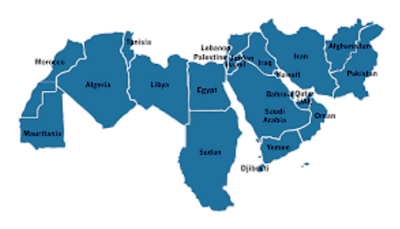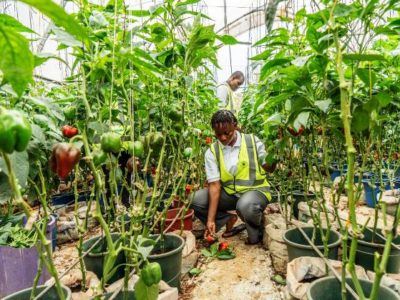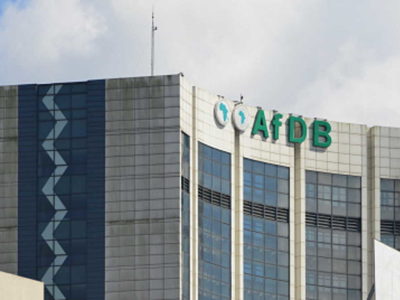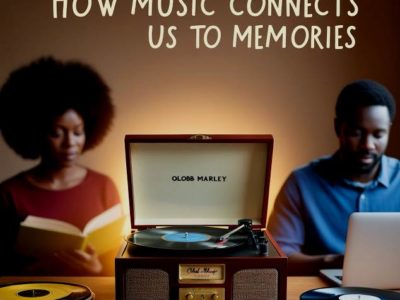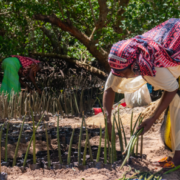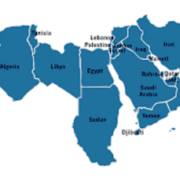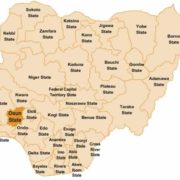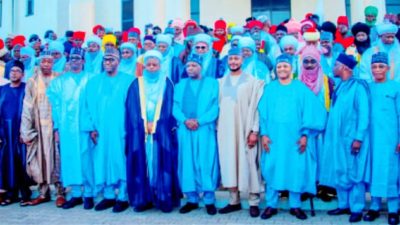In the Mountain of fire and Miracles Ministry, for as long as I can remember (which isn’t too long), there is an annual program which takes place on the days when the similar last numbers of the day, month, and the year appear on the same day. Some other churches, mostly Pentecostal churches have programs that are similar to MFM’s own, and though many people scoff at these programs, it doesn’t stop the teeming population of church goers in Nigeria, specially Lagos, from trooping to the church Avenue for the programme. Thus, we have had 2-2-2, 3-3-3, 4-4-4 and so on. I only started to attend these special programmes as of recent, starting with 7-7-7. The M.F.M “prayer city”, is located in Ibafo, along Ibadan Expressway, and other Pentecostal churches like Redeemed and Christ Embassy have their own versions of Prayer City along the same route. The vast population of these churches which troop to these special programs precipitates terrible traffic congestion along these routes.
Motorists that ply these routes always dread the coming of these ‘special programs’ because it would mean being stuck in a nightmarish traffic gridlock for seven, eight or even nine hours in some cases.
| Ishioma Deborah Ogbekene is in her final year at the University of Lagos studying History and Strategic Studies. 8-8-8: The journey to Prayer City is her first published effort at creative writing as a budding writer. Works are published under acceptance by the editorial team as part of Baobab Media’s overall objectives of encouraging original thinking and creativity by young African writers. |
I only started attending MFM’s annual programme, starting with 7-7-7-. I remember that horrendous, mind-numbing stay in the traffic with clarity, but it didn’t stop me and my family from attending the next one, 8-8-8. on the eighth of August, 2008. Bearing in mind the traffic situation on these days, as well as the fact that the Redeemed Christian Church of God was also having a program on that day, the MFM branch in my locality informed its members of the branch’s decision to leave very early on that fateful day. The eight of August fell on a Friday, so the program was going to be a night vigil. The branch had already made provisions for transportation for those interested in going to the Prayer City, but the bus that was provided wasn’t anywhere large enough for all those that were going.
We were supposed to have left the church premises by 2.pm, but by the time me and my family arrived, which was 3.30pm, the “Molue” which had be contracted to carry the members was already filled to overflowing. Earlier, my mother had called one of the coordinators to confirm the time, and he had told her the time was 4.00pm, only for us to get there 3.30pm and discover that the bus had been available since 2.30pm. My mum was furious, and demanded to know what was going to happen to the rest us that were stranded, to which Bro Yemi simply shrugged and said “you’ll have to find your way”. This only helped to incense my mum further. Quite a sizeable number of us were left stranded, and we looked helplessly on as our only means of transport revved it’s engine, emitted a great cloud of sulphorous smoke from it’s exhaust pipe and drove off with our fellow MFM’ites on board, abandoning us to our fate.
Those of us left behind, just hung around the church premises, hissing in disgust and complaining bitterly of the ineptitude and insensitivity of the transport coordinators. Thus we were in this state of confusion and helplessness for close to 20mins before my mum (champion that she is) decided that enough was enough and marched to the local garage to make enquiries for the charter of a bus. Some others followed her closely behind, and lent voice to the negotiations. Finally, we were able to hire the services of a driver and his bus. Big mistake.
Now, my locality is a little out of way community in between Ejigbo, Idimu, and Shasha, by the name of Orisunbare. Orisunbare’s bus drivers possess, the jalopiest, ricketiest, dirtiest buses on the surface of planet earth, (no exaggeration here). Whenever the locales enter these buses, by the time we get down, we are most times worse for the wear, exhausted without doing anything, our clothes dirtied by the filthy and raggedy chairs, legs cramping from lack of proper space to stretch them. I for one always experience severe cases of ‘pins and needles’ whenever I come down from one of these buses, and even once my behind has made rude contact with the ground on a busy street when I was alighting from one of these buses because my legs, cramped and in agony refused to respond to my brains commands.
It was one of such rickety contraptions that my mother hired on behalf of those of us left behind. The bus was a “danfo”, body battered, windows heavily coated with dust, and the seats, I am sure, must have been crawling with various specious of miniature, winged life forms. The driver of the jalopy didn’t look very different from his rickety automobile. Olomi, as he was popularly called in the garage, was a tall, charcoal skinned, camel faced Yoruba man with a voice that sounded like a frog croaking (this, I presume, was as a result of taking too much “kparaga” ). His eyes were a bright red, and when he turned to stare at me with those eyes (oh, the horror!), I involuntarily shuddered. “Seven thousand na last price”, he croaked. “Enh, we don hear you. You sure say this your bus fit carry as reach there?” , asked a young man eyeing the bus worriedly, to which Olomi huffed, and puffed, hit his hands on his chest and declared that his bus was indestructible, regardless of the fact that the appearance of the bus told a different tale. My instinct warned me that this scraggy looking unkempt man was lying, but like they say, when the desirable is not available, the available becomes desirable. Thus, against our better judgment, lulled into a false sense of security, we piled ourselves into Olomi’s jalopy bus, and had a very raw deal for our pains.
What could we have done otherwise? We had been abandoned by man, and we were desperately seeking an alternative, and since Olomi was willing to provide that alternative, we had no choice but to place ourselves at his mercy, and the mercy of God. And so on we went, with our hearts light and our spirits free.
We sang praise songs to God, and completely lost ourselves in the melodious voice of a female chorister in our midst. At a point, Olomi suddenly pulled over, got out of the vehicle and walked away. About five minutes later, he reappeared and informed us gruffly that he went to get a packet of cigarettes. We could only stare in disbelief. A voice rang out from the back of the bus “so Olomi, you leave us for center of the road go buy cigar?!” He ignored this indignant query, re-entered the vehicle and started the vehicle. The contraption groaned, coughed, and finally sputtered to life. Because of this delay, we were in the traffic for about two hours, and finally we arrived the prayer city at about 8.30pm. By this time, the traffic had started becoming very heavy, as more and more vehicles crawled their way at snail pace to the RCCG camp and MFM prayer city. We settled in, and waited for the vigil to start.
The vigil ended sometime around 3.15am, and the worshippers rushed out of the auditoriums in their thousands in a frantic rush to get on the road before the road became choked up. Us, “the abandoned”, rushed out and as a result of the congested environment, got to Olomi a bit late. By that time, he was already seething and threatening that if we provoked him, he would drive off and leave us to our own devices. We pleaded with him, before he finally calmed down.
We entered the vehicle, and he started the engine – or tried to start the engine. When the engine refused to start he ordered all the men in the vehicle to push the vehicle. There were only three men in the vehicle, the conductor included. The rains had fallen the previous day, and where Olomi parked the vehicle was muddy and water logged. When the men were unable to push the vehicle because of the muddy nature of the road, the “younguns” were ordered to join in the pushing. So, there we were, five young women, our pert and rotund behinds sticking out a mile long, and three out of shape men pushing a vehicle that had no business being on the road in the first place out of a muddy gorge. Meanwhile, the road was already jam-packed again with vehicles. Horns honked, exhaust pipes spewed out black and blue smoke, the weather was sultry, and to add to our discomfort was the mud that was slowly seeping into our shoes. Beside me, I could hear my sister grumbling under her breath. I couldn’t really blame her, we hadn’t bargained for this either. I looked up briefly from my exertions and stared at the traffic logjam on the road beside us, and not for the first time wondered why, Nigeria, with such a teeming church going population, still faced problems of crime and corruption. There had to have been at least ten thousand cars on the narrow road between the roads that run from inside the prayer city, to the expressway on outside of the main gate. And the human population on foot must have been triple that of the cars.
Olomi had started ministering to his stomach as early as 2.00am with shots of ‘paraga”, and was already hyper-drunk by 3.30am when we were ready to go. However, this alcohol induced adrenaline energy had started to dissipate by 6.00pm, when the vehicle was still unable to start. By this time, we were all weary of the whole situation, but we had no other alternative, and traffic was still pretty heavy.
8. 30 Am. The traffic had by now thinned out considerably. Olomi’s rickety bus had by now completely given up. My mother dozed in the front seat. Some girls close by me were chatting, and from where I was, I could perceive the very unfragrant aroma of their unwashed mouths. “Olomi, wetin happen again?” asked the only youngman, left in our midst. The rest had disappeared sometime during the early hours of the morning while we dozed in the vehicle. Olomi had sent his conductor to rent a battery from one of the little communities that clustered around the prayer city. When the conductor arrived with the battery, he was complaining bitterly of backache, and was yelling at Olomi for leaving all the work for him, while he, Olomi, consumed shot after shot of “kparaga”. Olomi had by now consumed about 500 naira worth “kparaga”.
The dead battery was replaced by the rented battery and this took about another 30 minutes. It seemed that in a drunken haze, Olomi had not properly connected the pipe leading from the fuel tank to the engine. Nelson, the man left with us had reminded Olomi to ensure he fixed this, to which Olomi only grunted. We were ordered out of the bus, and we stood by the road-side, praying that this time, the engine would start, and, we, The Abandoned, would finally be able to go home.
As the men gathered to push the bus, Nelson whispered to my sister that in trying to help Olomi push the bus, the vehicle had run over his foot, and he lifted the throbbing foot for her inspection. “Ewww, it’s a sacrifice of love!” said my sister, and we started giggling.
“Ready!” shouted one of the mechanics present on the scene. Olomi entered the driver’s seat, and got ready to start the vehicle. And the pushing began. Suddenly, Nelson started yelling, “Olomi, stop, stop, stop!” Olomi was either too drunk too hear him, or just simply ignored him. Right before our eyes, the rickety danfo bus suddenly burst into flames. Obviously, Olomi had failed to properly fix the leaking pipe to the engine, thus the heat of the engines had ignited the fuel from the pipe. “That is it; we are so out of here!”, exclaimed my sister. She grabbed the hand of hysterically weeping Nelson, who insisted on staying behind to watch the bus burns. My mother would have none of it, and as fortune would have it, a bus going to Iyana-Ipaja, our direction stopped and we all herded ourselves into the bus. As the bus drove away, I turned to look at the burning bus one last time, and saw Olomi, all drunkenness gone, running around the flaming bus on the expressway, eyes bulging, his face contorted into a mask of terror and agony, and screaming in Yoruba, “Please help me o, help me o, don’t let my oga’s motor burn o!”.
What could we have done? Absolutely nothing. The vehicle had no business being on the road in the first place, or at least, outside of Orisunbare. How we got home that day, and what we, “The Abandoned”, learned at the garage on our arrival, is a tale for another day.

